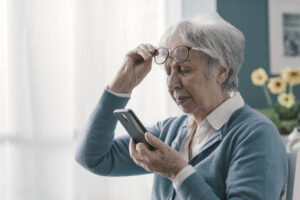 As we age, many people start to have poor vision, which may be mistakenly diagnosed with mild brain decline. To ensure that seniors are getting the appropriate care, it’s essential to understand the differences between poor vision and mild brain decline. By doing so, we can help ensure that older people can live fulfilling lives despite any vision or cognitive impairments they may have.
As we age, many people start to have poor vision, which may be mistakenly diagnosed with mild brain decline. To ensure that seniors are getting the appropriate care, it’s essential to understand the differences between poor vision and mild brain decline. By doing so, we can help ensure that older people can live fulfilling lives despite any vision or cognitive impairments they may have.
A new study has found that millions of older people with poor vision are at risk of being misdiagnosed with mild cognitive impairments. The study, conducted by the University of South Australia, found that vision problems can lead to difficulties with memory and executive function tasks.
Advertisement
The study’s authors say that this can result in older adults being wrongly diagnosed with dementia or Alzheimer’s disease. They add those vision problems are often overlooked as a potential cause of cognitive decline and that more awareness is needed among health professionals. The findings highlight the importance of vision screening in older adults and suggest that vision problems should be considered when assessing cognitive decline.
For the study, researchers required 24 normal vision participants to complete two cognitive tests based on verbal fluency and vision-dependent reactive tasks. Using a set of glasses that simulate age-related macular degeneration (AMD), the participants scored far lower on the cognitive test involving reaction time tasks than without the glasses. There was no significant difference with the verbal fluency test when using the glasses.
“A mistaken score in cognitive tests could have devastating ramifications, leading to unnecessary changes to a person’s living, working, financial or social circumstances,” said study author Anne Macnamara.
Age-related macular degeneration (AMD) is a leading cause of vision loss for older people. While it does not cause complete vision loss, it does severely impact people’s ability to read, drive, cook, and even recognize faces. It has no bearing on cognition.
Nearly 15 million Americans are living with AMD, and that number is expected to rise to 30 million by 2050. There is no cure for AMD, but there are treatments that can slow its progression and help preserve vision. Early detection is key, so it’s important to get regular eye exams as you age. As this study shows, eye health is vital to understand, so it doesn’t get misdiagnosed.
Vision Loss
Advertisement
One of the primary causes of age-related vision loss is low levels of lutein and zeaxanthin. These natural pigments have been shown to protect the eye from oxidative damage caused by ultraviolet light and environmental factors.
Some of the best sources of lutein and zeaxanthin, but it is difficult to get enough of these pigments from diet alone. 20/20 Vision contains 20 mg of lutein and 2 mg of zeaxanthin to help give your eyes the nutritional support they require. In addition to those two ingredients, this unique formula also contains various vitamins, minerals, and herbal ingredients to help support and maximize eye sight and overall eye health.
Stress can take a toll on the brain, affecting memory, concentration, and overall cognitive function. The Smart Pill can help counteract these effects through nine ingredients that help support, nourish, and maximize brain health and cognitive function. These include ginkgo biloba, huperzine A, bacopa extract, rosemary extract, and a B vitamin complex. This unique formula helps boost circulation, fight free radicals, and help to promote clear thinking and healthy brain function.
